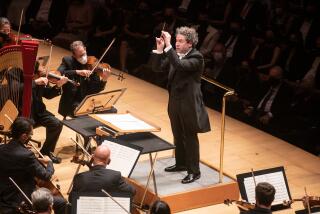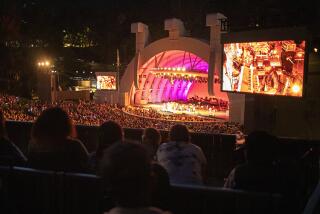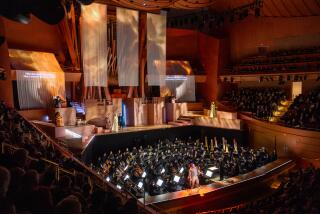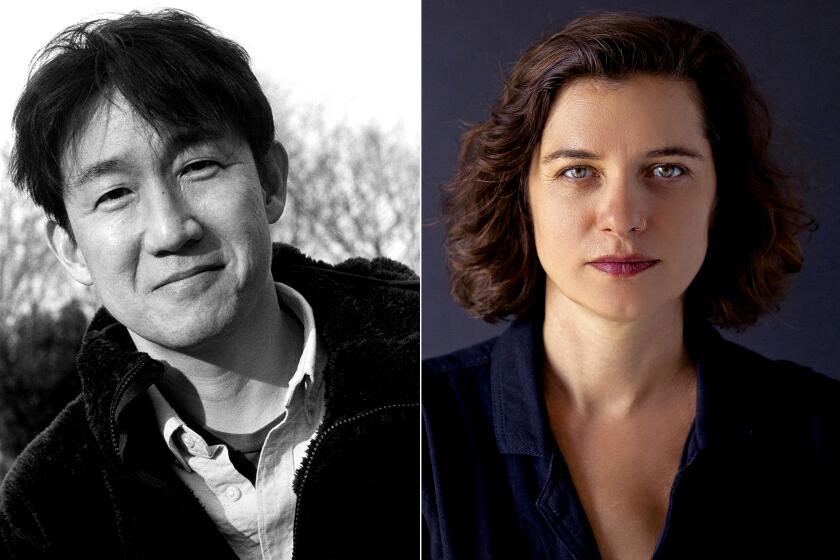Review: Benjamin Millepied’s ‘Romeo and Juliet,’ this time at the Hollywood Bowl
It is much too early to come down with the Hollywood Bowl blues, this second week of the Los Angeles Philharmonic’s summer season. Yet on a seemingly innocuous Tuesday, the iconic amphitheater was already advertising its inaccessibility.
As I fumed in gridlock, trapped in an hourlong stretch of Sunset in Brentwood that I could walk in half the time, L.A. felt downright dystopic.
But then that ol’ Bowl black magic got under my skin, and unmistakably that of thousands of others. The weather was mild. Overhead was what some Native Americans call a full buck moon. And Gustavo Dudamel was back to begin his two weeks with the orchestra at the Bowl.
Neither Dudamel nor the L.A. Phil happened to be the center of attention. The video cameras barely acknowledged either. One attraction was, instead, the debut of a dashing 28-year-old Spanish cellist, Pablo Ferrández, whose pop-idol magnetism, superb technique and exhilarating musicality reveal a sure star in the making. The other was a revival and expansion of the L.A. Dance Project’s L.A.-centric version of Prokofiev’s “Romeo and Juliet,” which choreographer Benjamin Millepied created for Walt Disney Concert Hall last fall and has now brilliantly adapted to the Bowl.
Even so, Dudamel and the L.A. Phil were at the heart of it all. More than any other L.A. Phil music director in the orchestra’s 100-year history, Dudamel loves the Bowl and is on his way to being the conductor who has led the orchestra the most in the open air. His moment of celebratory Bowl-ing will be “Bravo Gustavo!” on Thursday, honoring his 10th anniversary as L.A. Phil music director.
The evening began, as tradition demands, with the national anthem. A fine Ph.D. dissertation that intersects conducting with international affairs would be a study in “Oh, say, can you see” by the evening’s dimming light. The interpretation might be rousing, purposeful, obligatory, careful, clumsy. Some in the crowd sing, some look at cellphones. The flag blows in the wind and you think about the country or fret.
Dudamel conducts it with a unique combination of grace, sensuality and warmth. The smile on his face is not broad, just enough to suggest he wants to be here, conducting this anthem for the sake of a moment of togetherness. To set a tone.
Then there was the challenge of Dvorák’s popular and, of course, overplayed Cello Concerto. Every cellist proves his or her or their self with it. Ferrández was no exception. The cameras could barely take their lens off him. On the video screens, you saw what could have been a fashionable actor in a movie, romantically emoting as they all do when they pretend to be classical musicians. Only, Ferrández was for real, suave in the lyrical sections and able to bring a vitality to all else he touched.
How much Dudamel had to do with this is hard to tell. Musicians rehearse very little at the Bowl, and the orchestra also had a complicated ballet to contend with. Dudamel, though, brought out a whole range of details, inner lines that you may have never before noticed. Maybe he was remembering conducting the concerto during his first season as music director. Then 29, he so threw himself into a sensation-making performance that he threw out his shoulder and had to be taken to the hospital at intermission. This time, he provided substance seeming to lead Ferrández to an interpretive place that already makes his youthful 5-year-old recording of the concert sound like a relic.
Millepied’s “Romeo and Juliet” was much like that at Disney Hall but also entirely different, given the venue. The Romeo and Juliet, David Adrian Freeland Jr. and Janie Taylor, were the same as the first night in Disney. (The subsequent two performances had same-sex couples, one with women, the other with men.) Some of the sections from the ballet — there were 40 minutes of excerpts — were danced on the Bowl stage. For the rest, Millepied followed the principals backstage, in the hills behind the seats and throughout the amphitheater with a hand-held video camera.
On video, the ensemble dance onstage worked even less well than in the hall. This was mostly long shots with tiny figures, although a listener could happily focus on the exceptional playing of Prokofiev’s score.
Millepied plans to make a film of the complete ballet using locations around L.A. and a recording of Dudamel’s performance. The Hollywood Bowl bits offered a preview of just how effective that might turn out. For the balcony scene, the lovers ran out the West Entrance, up the escalator and behind the seats onto the parking lot, which looked like a quiet country road. The sensation for the audience became a mix of feeling like you were there while the action still seemed far away.
The fight scenes took place in the aisles. You looked for the details on the Bowl’s giant screens while actually being in the center of the action. Millepied’s dancing camerawork gave a new physical sense to his choreography. And there was the full buck moon lighting. We could watch the way the choreographer wanted us to. Illuminating amplification gave Prokofiev a soundtrack character, yet it too could be understood as alive and real.
This should be the future of virtual reality — not those silly headsets, pixilated video, cheapo headphones and compressed audio. And for that, two hours in traffic is not too high a price to pay.
More to Read
The biggest entertainment stories
Get our big stories about Hollywood, film, television, music, arts, culture and more right in your inbox as soon as they publish.
You may occasionally receive promotional content from the Los Angeles Times.







